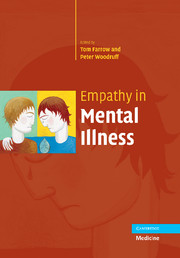Book contents
- Frontmatter
- Contents
- Foreword
- List of contributors
- Part I ‘Dysempathy’ in psychiatric samples
- Part II Empathy and related concepts in health
- 9 Neonatal antecedents for empathy
- 10 The evolutionary neurobiology, emergence and facilitation of empathy
- 11 Naturally occurring variability in state empathy
- 12 Neuroimaging of empathy
- 13 The neurophysiology of empathy
- 14 The cognitive neuropsychology of empathy
- 15 The genetics of empathy and its disorders
- 16 Empathogenic agents: their use, abuse, mechanism of action and addiction potential
- 17 Existential empathy: the intimacy of self and other
- 18 Empathizing and systemizing in males, females and autism: a test of the neural competition theory
- 19 Motivational-affective processing and the neural foundations of empathy
- 20 Face processing and empathy
- Part III Empathy models, regulation and measurement of empathy
- Index
15 - The genetics of empathy and its disorders
from Part II - Empathy and related concepts in health
Published online by Cambridge University Press: 17 August 2009
- Frontmatter
- Contents
- Foreword
- List of contributors
- Part I ‘Dysempathy’ in psychiatric samples
- Part II Empathy and related concepts in health
- 9 Neonatal antecedents for empathy
- 10 The evolutionary neurobiology, emergence and facilitation of empathy
- 11 Naturally occurring variability in state empathy
- 12 Neuroimaging of empathy
- 13 The neurophysiology of empathy
- 14 The cognitive neuropsychology of empathy
- 15 The genetics of empathy and its disorders
- 16 Empathogenic agents: their use, abuse, mechanism of action and addiction potential
- 17 Existential empathy: the intimacy of self and other
- 18 Empathizing and systemizing in males, females and autism: a test of the neural competition theory
- 19 Motivational-affective processing and the neural foundations of empathy
- 20 Face processing and empathy
- Part III Empathy models, regulation and measurement of empathy
- Index
Summary
Introduction
Substantial evidence now shows that the differences between individuals in their empathy for one another are influenced by multiple genetic and environmental factors. In this chapter, we will first describe the way empathy can be decomposed into multiple traits that can be reliably measured for genetic investigation. The results of genetic studies will then be reviewed, showing that empathy is a multifaceted phenomenon with complex dynamics influenced by non-linear interactions among biological, psychological and social processes. Available data suggest important clues to possible genetic mechanisms that underlie individual differences in the development of empathy, but as a wide variety of measures have been used, it is essential to begin with a critical discussion of their limitations and interpretation.
Deconstructing empathy
Empathy is an active process, or set of processes, in the relationship of one human being with another. Empathy may be spontaneous or calculated. It may be processed emotionally or by discursive reasoning, and it may be facilitated or impeded by volition (i.e. intentions involving particular goals and values). As it involves two or more humans (even if one of them is for example described in a book), empathy is dependent on social context. Our ability to empathize with others is, among innumerable other factors, influenced by our general well-being, prejudices, attitudes and position in the encounter.
- Type
- Chapter
- Information
- Empathy in Mental Illness , pp. 261 - 288Publisher: Cambridge University PressPrint publication year: 2007
- 2
- Cited by



